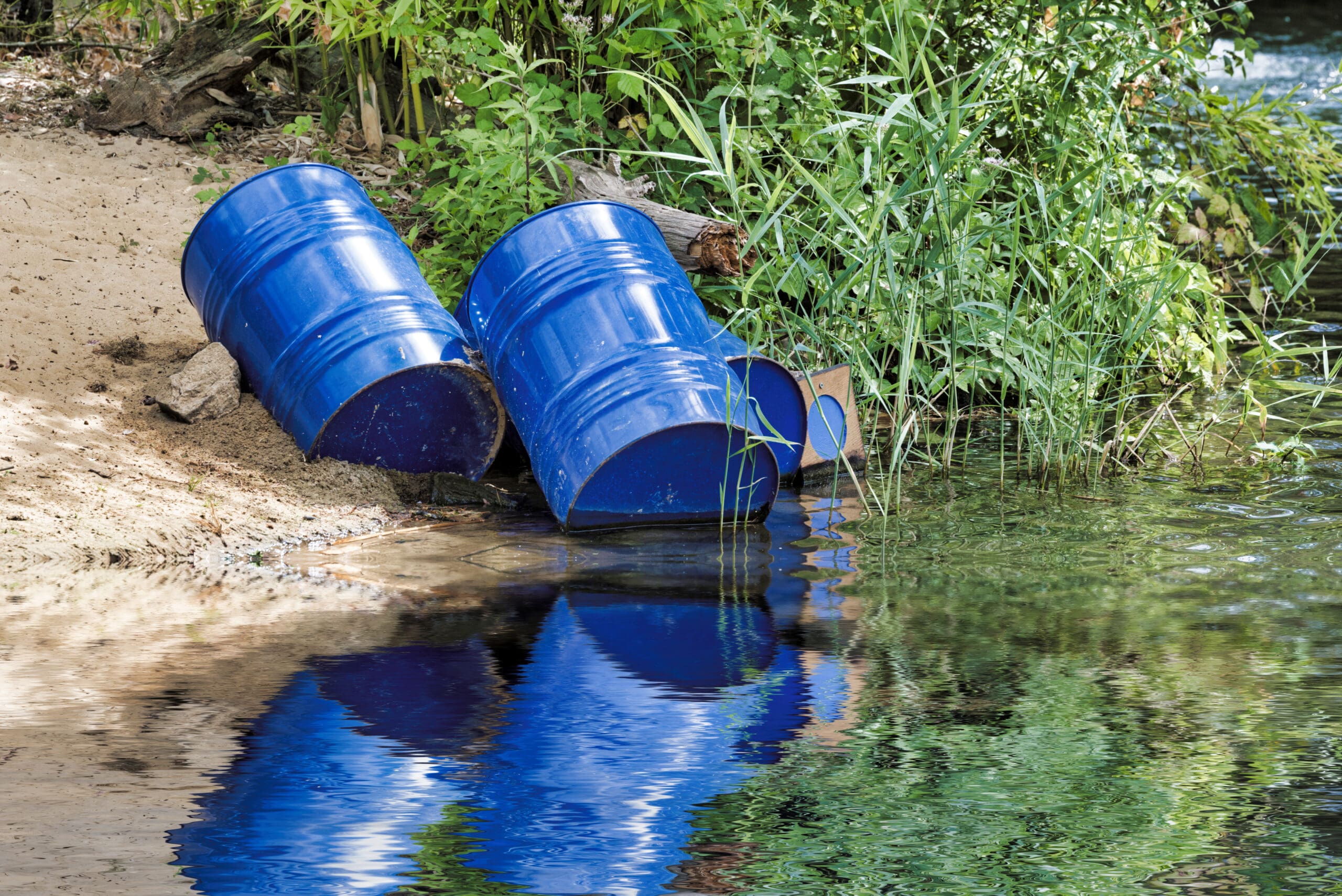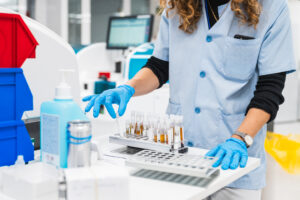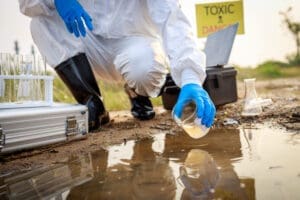
Pfizer Chemical Spill Affects Michigan
Corporate environmental responsibility has never been more prominent or critical. The events and aftermath of Pfizer’s toxic chemical dump into a dedicated drain that runs to the Kalamazoo Water Reclamation Plant in Kalamazoo, MI, provide a profound case study of the intersection between industry and ecology, prompting crucial discussions on the long-term effects and the response required to uphold our environmental stewardship.
While Pzifer did notify city officials that it dumped well more than its allowed amount of methylene chloride into the dedicated drain, the wide-reaching repercussions of this environmental tragedy won’t be felt right away. The complexities of cleanup efforts showcase just how impactful chemical dumps in our waterways are, yet it opens the door for even more discussion on a responsible, sustainable way forward.
What is Methylene Chloride & Why is it Used?
Methylene chloride, also known as dichloromethane (DCM), is a volatile, colorless liquid with a sweetish odor, widely used as a solvent in various industrial processes. This chemical compound has been heavily utilized in paint stripping, pharmaceutical manufacturing, and as a degreaser due to its high efficiency in dissolving a wide range of organic compounds. Its ability to quickly evaporate into the air and its minimal residue make it a preferred choice for use in these sectors. However, the very volatility that makes the chemical so effective can also pose significant health and environmental hazards if mishandled or accidentally released into the environment.
Exposure to high levels of methylene chloride can lead to serious health issues, including respiratory problems, nervous system effects, liver and lung damage, and in extreme cases, death. Therefore, its use demands strict handling and disposal protocols to mitigate any potential harm.

The Environmental Domino Effect
Pfizer’s chemical dump in Michigan is more than a mere industrial mishap; it raises questions about the diffusion and persistence of toxic substances in the environment. The immediate ecological implications could be staggering. For example, the release of this hazardous waste could begin to stunt plant growth, disrupting the river’s natural balance.
Beyond the immediate crisis, the long-term effects are equally disturbing. The chemical composition of the riverbed and the lingering impacts on aquatic life may resonate for decades, affecting not only the immediate environment but also those downstream, especially for communities who rely on the Kalamazoo River and its tributaries.
Caution Advised for Kalamazoo River Users
In the unfolding scenario of Pfizer’s chemical spill, a crucial point of concern is the uncertainty surrounding the exact amount of methylene chloride that was discharged into a dedicated drain, ultimately leading to the Kalamazoo Water Reclamation Plant. This facility, though robust in its treatment capabilities, is designed to handle no more than 291 gallons per day of methylene chloride. The mishap has prompted a swift response from local health and environmental authorities.
In fact, the Kalamazoo County Health & Community Services Department, alongside the City of Kalamazoo Department of Public Services, has issued a precautionary ‘no-contact’ advisory, urging the public to steer clear of the Kalamazoo River. This advisory spans from the Paterson Street Bridge in the city of Kalamazoo to the D Avenue Bridge in Cooper Township. The guidance comes as a preventive measure to safeguard the community’s health and well-being, taking into account the potential risks associated with exposure to the spilled chemical.
A Persistent Pattern: Reflecting on Michigan’s Chemical Spills
Despite advances in technology and regulatory oversight, chemical spills continue to mar Michigan’s environmental and public health landscape. The incident with Pfizer is not an isolated event but rather a part of a disconcerting pattern of chemical mishaps that have hit the state.
Just last month, environmental advocates and residents from Detroit came together to urge the state to protect local waterways and communities. This action was in the wake of two other chemical spills, one in Warren, MI, and one in Trenton, MI. In 2022, the Huron River in southeastern Michigan experienced its second major chemical spill in four years, leading to the closure of the river for several months.
These incidents, including Pfizer’s methylene chloride dump, underscore a recurring issue with handling hazardous materials and the urgent need for a comprehensive approach to prevent future spills. They highlight the gaps in regulatory compliance, the challenge of aging infrastructure, and the critical importance of proactive environmental stewardship.
Looking forward, it is imperative that we learn from these mishaps. Strengthening regulations, investing in infrastructure modernization, and fostering a culture of corporate environmental accountability are vital steps.
Additionally, enhancing community awareness and engagement in environmental conservation practices can play a significant role in safeguarding Michigan’s precious natural resources for future generations.

Protecting Our Water, Protecting Our Health: Solutions for Kalamazoo and Western Michigan
Due to recent events, businesses and residents of Kalamazoo and the broader western and southern portions of Michigan are understandably concerned about the quality of their drinking water. The threat these chemicals pose to our health and well-being underscores the urgent need for reliable water purification solutions. One such effective measure is the adoption of bottleless water coolers and filtration systems provided by companies like Artesian Bottleless Water.
Artesian Bottleless Water specializes in advanced water filtration systems designed to remove harmful contaminants, including chemicals like methylene chloride. These systems offer a dual benefit: they ensure that the water you drink is safe and free from hazardous substances and contribute to reducing plastic waste, making them an environmentally friendly alternative to traditional bottled water coolers.
For businesses and homeowners in the area, investing in a bottleless water cooler or RO drinking water system is a proactive step towards safeguarding health. Our systems are efficient and cost-effective and ensure continuous access to clean, purified drinking water. By choosing such a sustainable and reliable water source, residents and businesses can protect themselves from the harmful effects of chemical contaminants while also contributing to the preservation of our precious waterways.
Forge a Sustainable Future With Clean Drinking Water
The Pfizer spill urges us to reevaluate our approach to corporate environmental responsibility. When industries and local residents work together towards regenerative solutions, like the restoration and preservation of the Kalamazoo River, we pave the way for a sustainable future.
Unfortunately, the long-term effects of any of these industrial chemical spills haven’t yet fully been felt. But that doesn’t negate the fact that our drinking water resources are at risk. So, if you’re looking for peace of mind in a world full of uncertainties, Artesian has the answer. We’d love for you to taste the difference with a risk-free 7-day trial. We promise you, your office, and your family will love the pure, refreshing, clean water and ice.
Together, we can forge the future through clean drinking water.



